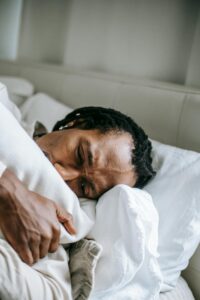We all experience some anxiety symptoms now and then. The source of that anxiety may vary because what triggers each person’s anxiety doesn’t always look the same. Though anxiety is a common human experience, it can begin undermining your well-being as well as derailing your daily functioning. When that happens, it’s important to get help.
It is common for men to put off getting help or to seek support of any kind when they need it. This may be socialization which says men are meant to be self-reliant, tough, able to manage hardship, and capable of pushing through whatever obstacle is put in front of them.
Such a perspective, whether held by the man or the people around him, can make it difficult for a man to face an issue that requires his attention, or recognize he needs help. Even more difficult is the step of actually seeking help and availing himself of the resources available to him.
The prevalence of anxiety symptoms among men
 Anxiety disorders are quite common among men in the United States and across the world. Two hundred and sixty-four million people around the world are affected by anxiety disorders, forty million of whom are in the United States.
Anxiety disorders are quite common among men in the United States and across the world. Two hundred and sixty-four million people around the world are affected by anxiety disorders, forty million of whom are in the United States.
Though women have a greater prevalence of anxiety disorder, it might be under-reported in men because they fail to seek help as often. At least 1 in 10 men (14%) in the United States will be affected by anxiety and anxiety disorders in their lifetime.
There are several causes for anxiety in men, and these include family pressures, relationship conflict, work stress, and experiencing trauma. Medical conditions such as heart disease and diabetes, and a natural decline in testosterone levels can also increase anxiety as well as stress levels.
Anxiety symptoms in men
Many of the signs of anxiety are common in both genders. The symptoms of anxiety can vary from individual to individual, and they won’t necessarily fall in line with any gender distinctions. One gender difference regarding anxiety is how men typically deal with their anxiety. Men tend to turn toward substance abuse to deal with their anxiety, while women often tend to resort to avoidance to deal with their anxiety.
The symptoms of male anxiety can be physical and emotional, and they can go far beyond feelings of worry or fear. Some of the symptoms of anxiety in men include the following:
- A rapid heart rate
- Shortness of breath
- Excessive sweating
- Headaches
- Muscle tension
- Feeling agitated, irritable
- Outbursts of anger
 Fear of losing control
Fear of losing control- Being on edge, and overly vigilant about the potential for danger
- Feeling restless
- Sleep problems, including insomnia
- Gastrointestinal distress and issues
- Dizziness or vertigo
- Worrying about things going wrong
- Catastrophic thinking.
- A sense of dread
- Avoidance
- Being absentminded
- Having difficulty concentrating
If you or a loved one experiences these symptoms, seek help from a medical professional such as a doctor or a counselor who deals with anxiety and anxiety disorders.
Finding help to deal with anxiety
How a man is socialized can have a significant impact on whether and how he addresses his anxiety. Some men may think it is a sign of weakness to admit they are struggling with something or assume that the solution is simply to tough it out, snap out of it, or just wait and see what happens. Anxiety and anxiety disorders require intentionality to deal with them effectively. It is not weak to seek help when you need it.
 If you suspect that you may have anxiety, one of the first steps of action is to talk to someone that you trust, whether a family member, your spouse, a friend, or your doctor. Your doctor is a useful first line of inquiry, and they can examine you for any other potential physical causes of your anxiety symptoms. If they rule out any physical cause, they can refer you to a mental health professional such as a counselor or psychiatrist.
If you suspect that you may have anxiety, one of the first steps of action is to talk to someone that you trust, whether a family member, your spouse, a friend, or your doctor. Your doctor is a useful first line of inquiry, and they can examine you for any other potential physical causes of your anxiety symptoms. If they rule out any physical cause, they can refer you to a mental health professional such as a counselor or psychiatrist.
Your counselor can help you by devising a treatment plan that is unique to your circumstances. It may include making lifestyle changes such as getting better sleep and regular exercise, eating a healthy and balanced diet, and reducing your consumption of caffeinated drinks, alcohol, or other substances. Your counselor can also help you cope with difficult relationship dynamics and build healthier patterns of thinking and behavior.
Therapies such as cognitive behavioral therapy are helpful. These are often deployed in combination with medications such as antidepressants, benzodiazepines, and buspirone which may also be prescribed to help deal with the anxiety.
However, before prescribing medication, your doctor will likely test your testosterone levels, and if they are low, testosterone replacement therapy (TRT) is a good first option for treatment.
Getting help
Male anxiety can be brought under control. Reach out to us today at Culver City Christian Counseling and we can set you up with a qualified Christian counselor in Culver City, California. They can help you or your loved one walk through their anxiety and the circumstances that trigger it, as well as create a plan to combat it.
Photos:
“Pensive”, Courtesy of Victoria Romulo, Unsplash.com, Unsplash+ License; “Stressed”, Courtesy of Alex Green, Pexels.com, CC0 License; “Using a Smartphone”, Courtesy of Oladimeji Ajegbile, Pexels.com, CC0 License
-
Kate Motaung: Curator
Kate Motaung is the Senior Writer, Editor, and Content Manager for a multi-state company. She is the author of several books including Letters to Grief, 101 Prayers for Comfort in Difficult Times, and A Place to Land: A Story of Longing and Belonging...





